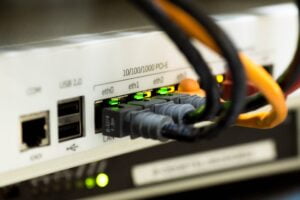Learning Outcomes
Knowledge and understanding
After studying this module, you should have gained:
- how to evaluate the impact of infrastructure networking communication systems, as used in local area networks (LAN) and wide area networks (WAN)
- how to justify the way that switches and routers are configured to provide secure and resilient network services
- how to justify the way that routing protocols are used by routers, and how this facilitates network design
- how to research current social, safety, commercial and organisational issues that need to be considered when planning communication networks
- some technological and utilisation trends in information and communication technologies and of the implications of these trends in future network development.
Cognitive skills
After studying this module you should be able to:
- apply appropriately the concepts and principles introduced in the module in a complex networking infrastructure context
- critically analyse available information to configure (program) network devices such as switches and routers
- design and develop a complex practice-based scenario using the concepts learned in the module
- evaluate evidence relating to changing organisational and user demand, which apply to secure and resilient networking infrastructure design.
Key skills
Studying this module should increase your ability to:
- communicate accurately and reliably in a structured and coherent fashion, recognising purpose and audience
- work effectively with others at a distance, where the collaboration is undertaken via computer-mediated communication
- work effectively with others in a lab setting when attending day schools
- use appropriate numerical and mathematical skills to analyse data
- conduct contextual research in the discipline of infrastructure networking
- organise time, study methods and resources.
Practical and professional skills
Once you have completed this module you should be able to:
- configure network devices such as switches and routers to ensure a secure resilient network infrastructure
- use specialist software tools and network operating systems
- gain first-hand experience of network equipment through attendance at the day schools or via the alternative learning experience (ALE)
- plan and organise yourself and your work appropriately when working in a group.
The skills listed above are relevant not only to your studies but also to other contexts, such as employment or voluntary work. For example, employers look for staff who can learn independently, communicate effectively and work well with others. So, the range of skills you develop during your study of TM357 will not only support your later studies. It will also be useful in other aspects of your life.


